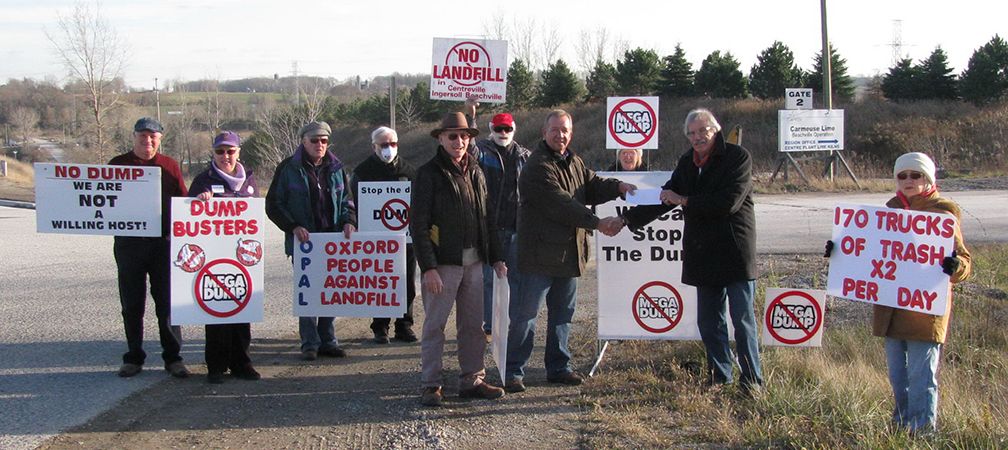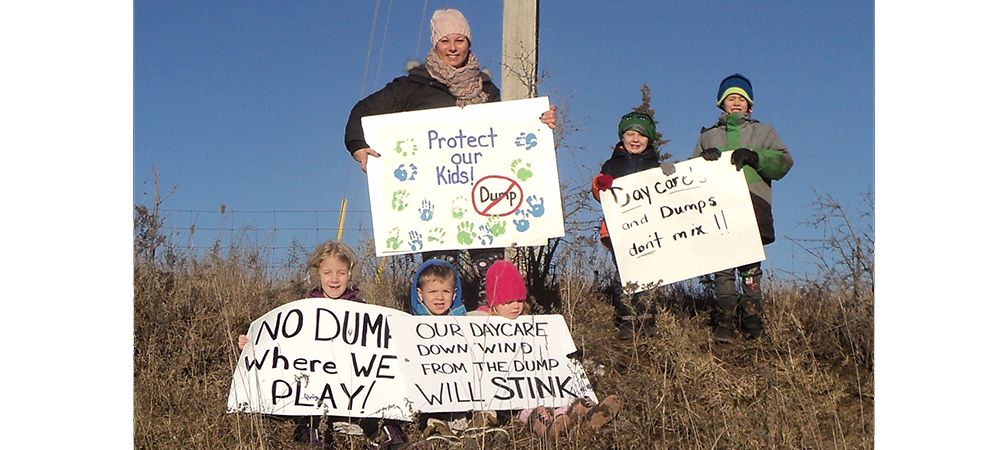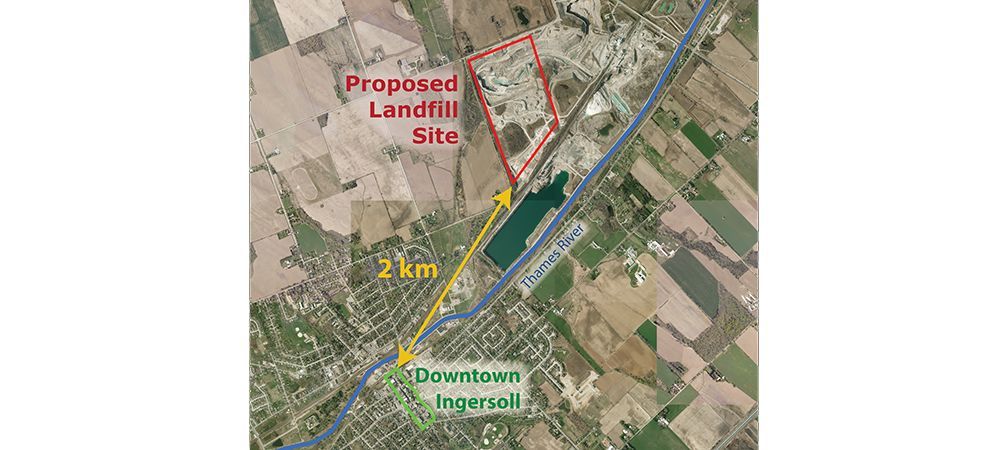Ontario Nature Blog
Receive email alerts about breaking conservation
and environmental news.
© Lora Denis
Ingersoll anti-landfill rally © OPAL Alliance
What were the odds that small rural towns and villages could successfully unite to save their communities and environment from a mega-landfill? Dismal at best!
When Walker Industries came to town and said they were situating a 17 million tonne mega-landfill on the border of Ingersoll, South-west Oxford and Zorra Townships, a small group of citizens and their town council took exception. Nine and a half years later, multiple information events, serious fundraising, over 300 members and volunteers, 50 newsletters, over 135,000 letters to six different Ministers of the Environment, along with a local council willing to do the unusual and hire a strategic consulting firm, the will of the people superseded the desire of the corporation.

What was at stake? Our environment, ground water, the Thames River watershed, quality of life for locals and people downstream. Oxford People Against the Landfill (OPAL), a grassroots organization, formed immediately and never gave up despite calls from some that “it was a done deal”.
What had a community among the first to adopt blue box recycling done to deserve mountains of unsorted garbage? What would be the success rate of the 4,000 or so spiny softshell turtle hatchlings in the Thames if the dump leachate drained into it? How would the escaping methane gas contribute to the climate crisis? We believed hauling trash into our beautiful landscape was unwarranted and worth resisting with all our small-town might. CBC Gem Good People agreed with us.

We knew the science was on our side. Dumps pollute for generations. OPAL hired renowned hydrogeologist, Wilf Ruland, and obtained legal support from the Canadian Environmental Law Association.
We harnessed the power of community scientists, who gathered countless documents about leaky liners infiltrating groundwater, photographing eagles nesting by the lake, and tracking down stories of other communities faced with similar challenges. We accessed expertise in and beyond the community. We claimed the high ground: the Ingersoll District Nature Club pronounced the dump to be “unnatural,” meaning it would be the undermining of site reclamation to its “natural” state.
Chief R. K. Joe Miskokomon of the Chippewas of the Thames First Nation said the process was “unconstitutional”. Independent scientists said it was “unrealistic”.

At the outset, we mounted a festival called “A River Runs Through Us” and invited everyone in town. We worked closely with our local councils. We supported the “Demand the Right” campaign – effectively pushing for communities to have a say in what mega-projects and industries come to disrupt their locales. More importantly, we never stopped believing, organizing, and fighting for Nature. In the end, the Demand the Right campaign convinced the current provincial government that all communities deserve to have a voice. Our communities exercised that right; this July four councils delivered a resounding NO to the proposed mega-landfill, effectively killing the project.
What does this mean to others fighting to save natural areas across Ontario being eyed for unsustainable development? That the fight is always worth your while and that nothing is impossible. Many discovered abilities they never would have believed in themselves. We met people who otherwise could have remained strangers. We made our community better and stronger and helped save the environment in the process. We, as citizens, need to push provincial and federal leaders harder, now more than ever, to listen to local experts and move towards a “nature-centric” world. The effects of climate change demand it. Communities demand it. Nature needs it, before it’s too late.
Subscribe to our blog to receive weekly email alerts about breaking conservation and environmental news.
 Sheila Fleming, a native of Ingersoll, is the Past President of the Ingersoll District Nature Club (IDNC), and Secretary to OPAL Alliance. An administrator in her professional life, she exercised learned skills to help shepherd the work of both organizations in the fight against the proposed landfill. A life-long naturalist, Sheila has supported IDNC for more than 20 years in their stewardship of the Lawson Nature Reserve, as well as endeavoured to educate the public on the importance of our natural world.
Sheila Fleming, a native of Ingersoll, is the Past President of the Ingersoll District Nature Club (IDNC), and Secretary to OPAL Alliance. An administrator in her professional life, she exercised learned skills to help shepherd the work of both organizations in the fight against the proposed landfill. A life-long naturalist, Sheila has supported IDNC for more than 20 years in their stewardship of the Lawson Nature Reserve, as well as endeavoured to educate the public on the importance of our natural world.
 Bryan Smith, a long-time member of The Oxford Coalition for Social Justice, joined OPAL at its initial meeting saying, “We are all in!” because “there is no social justice without clean drinking water”. His training in formal and popular education has helped him be the voice of opposition to the dump in recent years.
Bryan Smith, a long-time member of The Oxford Coalition for Social Justice, joined OPAL at its initial meeting saying, “We are all in!” because “there is no social justice without clean drinking water”. His training in formal and popular education has helped him be the voice of opposition to the dump in recent years.
Proposed 413 Route, Old School Road with farm and escarpment view © Noah Cole
Good environmental news! We have to keep up this kind of pressure.
Congratulations to all the members of OPAL on winning their very long and hard-fought battle to stop the mega-landfillproposed by Walker Industries near Beachville.
Thank you to Sheila Fleming and Bryan Smith for their informative Blog.